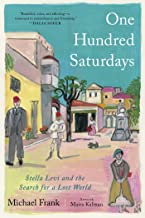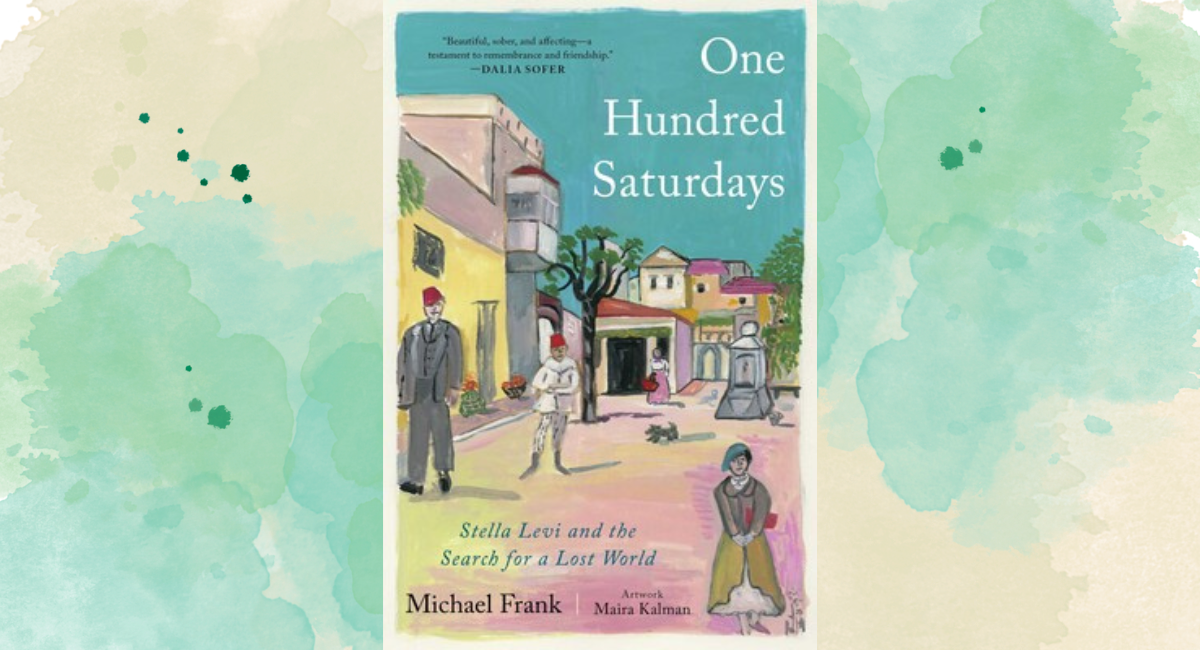One Hundred Saturdays by Michael Frank
One Hundred Saturdays (Avid Reader Press) is, quite simply, essential reading. Award-winning author Michael Frank has distilled six years of conversations between the now ninety-nine-year-old charming raconteur and inspirational Holocaust survivor Stella Levi into a slender yet powerful volume of memories of her life experiences. She was born in 1923 into a comfortable home in the Sephardic (Spanish) Jewish community on the island of Rhodes, located in the Grecian archipelago. The largest city on this same-named island was a sleepy, impoverished fishing village in the days before the tourist industry brought massive cruise ships into the deep harbor and the population burgeoned.
THE FACE OF ONE SURVIVOR
Stella was surrounded by the nurturing love, support and kinship provided by her large extended family, friends and neighbors. There were no strangers in the Jewish section and few elsewhere on the island. It was a nearly idyllic childhood for a girl who loved her studies, as well as her love of the sun and the sea where she learned to swim like a fish and scramble about like a young mountain goat on the rocky hillsides. From an early age, she packed a suitcase and kept it near her bedroom door, ready to seek higher education and adventures beyond the island. Few of her youthful dreams were fulfilled as she originally imagined, but in her post-WWII permanent home in Manhattan, she achieved a successful career in the textile industry, traveled widely and remained close to old and new friends. She relates an amusing tale of playing poker with chums Woody Allen and playwright Arthur Kopit until late one evening and taking home the pot. World travel including return pilgrimages to Rhodes has also been part of her destiny. There has been a great deal of history between Stella Levi’s halcyon childhood including a horrific eleven-month imprisonment in Auschwitz and the unimaginable loss of friends and family and her successful life after Rhodes. Her Holocaust story remains a period of time she prefers not to discuss nor dwell upon but which begs to be heard. Her vitality, determination and deep bonds of friendship have sustained her through celebrations and sorrows. It took author Michael Frank many months of conversations with Stella before she chose to speak about the Rhodelis Holocaust so movingly chronicled in One Hundred Saturdays.
INCOMPARABLY DETAILED RESEARCH
“Sepharad” is the Hebrew name for Spain. In 1492, the same year Christopher Columbus departed Cadiz for the New World, King Ferdinand and Queen Isabella expelled the Moors and the Sephardic Jews who had lived in Spain for hundreds of years. Businesses, homes and possessions were abandoned as the dispossessed scattered to several new homelands. Wherever they settled, these Sephardic Jews retained their religion, traditions, literature and language. Judeo-Spanish/Ladino is an archaic, medieval Castilian Spanish mixed with borrowed words from the new lands. Rhodes was one of many destinations during the 16th-century diaspora and it had been home to a Jewish quarter since Roman times. The island was important strategically for its maritime trade and historically for The Colossus of Rhodes, a massive statue of the Greek sun-god Helios, one of the Seven Wonders of the World, until its destruction by an earthquake circa 224 BC. Rhodes became a center for learning under Roman rule and was influenced by several subsequent occupying rulers. The Ottoman (Turkish) Empire reigned for nearly 500 years until the 1912 Treaty of Lausanne assigned possession to Italy. Their eventual Axis Alliance with Germany spelled doom for the residents of the Jewish quarter.
In September 1943, German troops occupied the island in preparation for the elimination of the Sephardic Jews as part of their “final solution” for all Jews. The German-Italian Axis alliance had already brought many restrictions to the Jewish community, including the takeover of businesses and homes, the denial of education, and food shortages. Stella Levi and a handful of friends had continued secretly to receive their education for gratis by their sympathetic Italian schoolteacher who took great personal risks in continuing to teach them. Like many of the Rhodelis, Stella spoke Judeo Spanish/Ladino at home, knew Turkish, at least some Greek and Italian as spoken by the occupiers, and studied French in school. The latter proved to be the most useful in communicating in the concentration camp at Auschwitz as neither she nor her companions knew German or Yiddish. In point of fact, many of the German and Polish Jewish prisoners doubted the new arrivals were actually Jewish because of their inability to speak Yiddish. They were finally convinced when they heard them reciting the familiar prayers for the dead.
THE MEMORY KEEPER OF A FALLEN COMMUNITY
It was later confirmed the Italian Police had provided detailed lists of the entire Jewish population to their German allies. This entire Jewish community, about 1673 people, was loaded onto three overcrowded, aging barges on July 23, 1944, for an arduous journey to Athens where they were held temporarily in the Haidari concentration camp. They were crammed into cattle cars in the suffocating heat for an agonizing 13-day trip to Auschwitz, which most thought was a labor camp, and a number of them died during these three hellish weeks of transport. Some men were sent to labor camps and others, including Stella Levi, were imprisoned until liberation. Within a few hours of arriving, the majority were summarily executed with poison gas and disposed of in the crematoriums. Less than 10%, or about 151 Sephardi Jews of Rhodes, survived.
Poignantly and significantly, Stella Levi is most likely the last remaining Auschwitz survivor from Rhodes, the defacto voice for and eyewitness to the 20th century tragic annihilation of the entire Sephardic Jewish community by the unimaginably evil Nazi forces. The concentration camp survivors did not return to their homeland after liberation. She is the memory keeper of a lost civilization that peacefully and harmoniously lived, worked and raised generations of families on this largest of the Greek Dodecanese islands for nearly half a millennium.
Michael Frank has done a masterful job with One Hundred Saturdays of coaxing these stories from the sometimes reluctant narrator. The Rhodes Holocaust is an important and lesser-known chapter in history, and Stella Levi’s vivid remembrances deserve a wide audience. The book will add immeasurably to Jewish Studies worldwide and would be an excellent selection for book clubs. One of the obvious comparisons is Mitch Albom’s inspiring Tuesdays with Morrie.
A LASTING IMPRESSION
Normally, I avoid inserting myself into reviews; however One Hundred Saturdays is deeply personal to me. When I lived in Seattle, I knew several members of the Sephardi Jewish community whose roots lay in Rhodes. I worked for the late John Franco for five years at his popular lakefront restaurant and knew several of his family members. John was born on Rhodes and moved to Washington State as a toddler. I became friends with war hero Ike Alhadeff who passed away at age 96 in 2012. He was sent by his family to Rhodes in 1938 to retrieve his grandmother. During WWII, First Lieutenant and pilot Alhadeff flew a B-17 Flying Fortress on D-Day and was later shot down over Germany and imprisoned in Stalag Luft III (the camp made widely notorious by the book and movie, The Great Escape). Ike and his older brothers owned and operated Pacific Fish, the family business their parents began shortly after emigrating from Rhodes in 1904. They were the first of the Sephardic Jews to move to Seattle and were instrumental in bringing over additional family and members of the Rhodelis community. The Franco and Alhadeff Families were among the many Sephardic Jews who were active members of Seattle’s business and cultural community as well as quiet philanthropists in Seattle who enriched their new home immeasurably. I retain the fondest of memories of these fine, generous and industrious people.
After reading One Hundred Saturdays, I communicated with the author, Michael Frank, who shared my initial email with Stella Levi. She remembered Ike Alhadeff’s visit to Rhodes while rescuing his grandmother and recalled her name was “Ermana Mazaltov di Jakov Pasha,” born into the Notrica Family; the youngest sister of Stella’s Notrica grandmother, which made her Stella’s Great-Aunt and my dear old friend her cousin. Sadly, among the more than 1500 Sephardic Jews to die in Auschwitz were more than 100 members of the Alhadeff Family and nearly 50 of the Franco Family. May all the victims of the Holocaust be forever remembered.
About Michael Frank:
Michael Frank’s essays, articles, and short stories have appeared in The New York Times, The Wall Street Journal, The Atlantic, Slate, The Yale Review, Salmagundi, The TLS, and Tablet, among other publications. His fiction has been presented at Symphony Space’s Selected Shorts: A Celebration of the Short Story, and his travel writing has been collected in Italy: The Best Travel Writing from The New York Times. He served as a Contributing Writer to the Los Angeles Times Book Review for nearly ten years. A recipient of a 2020 Guggenheim Fellowship, he lives with his family in New York City and Liguria, Italy.





